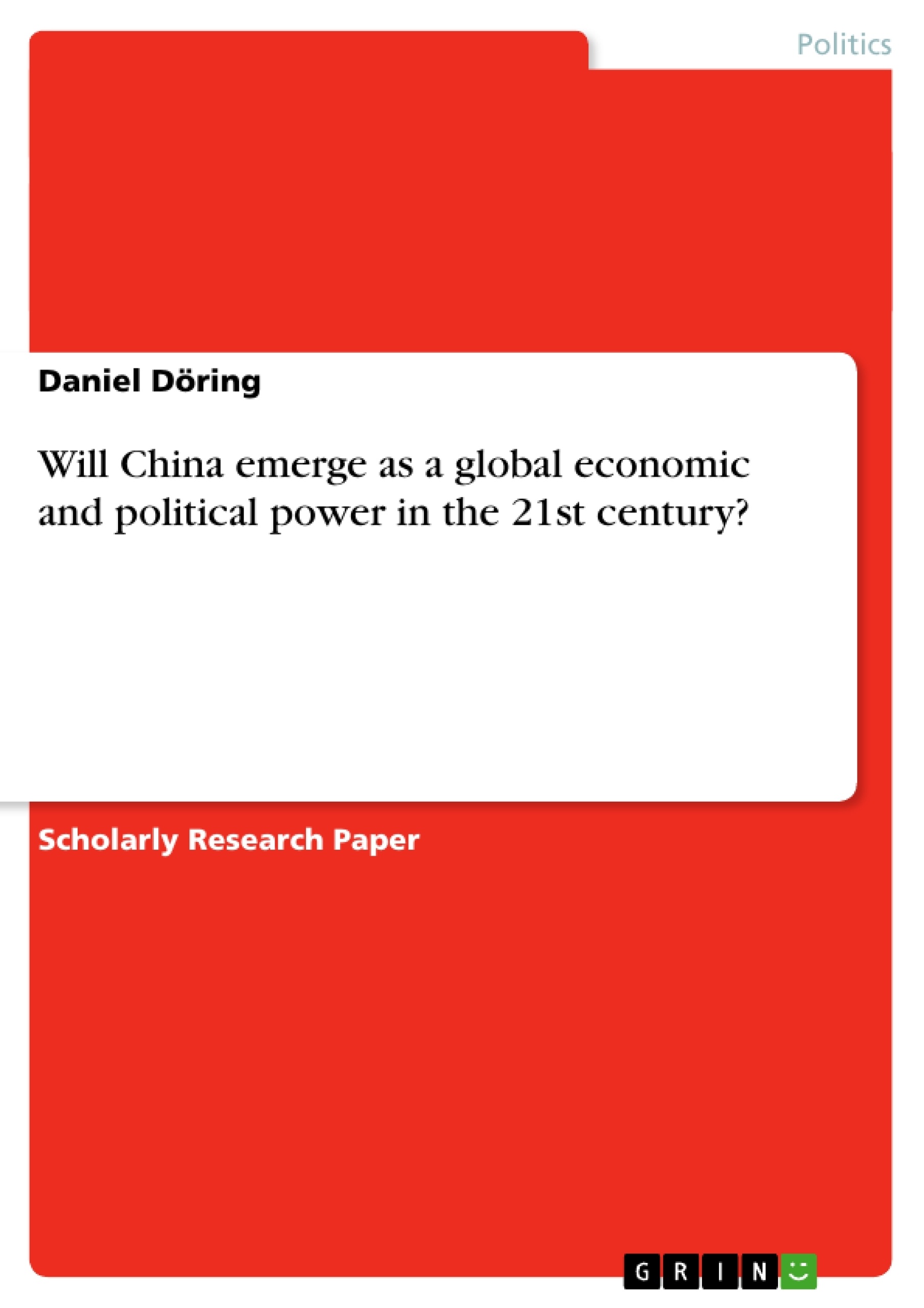China has become more interesting for investors and other global powers as it is developing very fast economically and politically. China has also become internationally very active in recent years, which certainly has attracted attention around the world. But we have to consider that China is still a developing country which is not willing to adapt in all areas of international reforms. Rising global powers, in this case China, have always trigged dramatic side effects or serious changes in the power structure of the world. Certainly imperial ambitions, aggressive expansion and striving for power are known to be the reasons for many wars, hence destruction and chaos. The world will have to cope with big challenges because of Chinas need for new recourses, power and recognition. China already goes international unacceptable ways according to Western powers as it cooperates with countries like Iran. In some ways a confrontation seems to be inevitable, as states like the USA want to keep their hegemonial position in the world as long they got the power on their side. On the other side China’s military chairman Hu Jintao guarantees a peaceful rise from which not only the own countries will profit, also the international world around. To answer the question I will focus on Chinas current status, and how political and economical actions will favour or hinder the rise to a global power.
Also I will focus on how US interaction may hinder the rise as they see a threat in China. What will happen if the sleeping dragon awakes economically and politically?
Inhaltsverzeichnis (Table of Contents)
- Introduction
- China and the World
- Foreign political influence
- Economic Advancement - Cutting risks and selective cooperation
- China and the USA...
- Evaluation.....
Zielsetzung und Themenschwerpunkte (Objectives and Key Themes)
This paper explores the question of whether China will emerge as a global economic and political power in the 21st century. It examines factors that could favour China's rise and potential hindrances. The paper analyzes China's current status and how its political and economic actions may contribute to or impede its ascent to global power. It also investigates the role of US interaction in potentially hindering China's rise.
- China's economic and political development
- China's foreign policy and its impact on international relations
- The "China-Threat" theory and its implications
- The role of the United States in shaping China's rise
- The potential for conflict or cooperation between China and the West
Zusammenfassung der Kapitel (Chapter Summaries)
- Introduction: The paper introduces the topic of China's potential rise to global power, highlighting its rapid economic and political development. It also acknowledges the potential challenges and tensions associated with this rise.
- China and the World: This chapter discusses the perception of China in the Western world as a potentially unpredictable power. It explores the "China-Threat" theory and its roots in cultural and ideological differences. It also examines the alternative perspective that views China as an opportunity for economic and political cooperation.
- Foreign political influence: This chapter analyzes China's foreign policy, focusing on its efforts to secure its position in the region. It discusses China's regional power ambitions, its commitment to the "One-China" policy, and its military buildup. It also acknowledges the challenges posed by China's large population and the need to address domestic social issues.
Schlüsselwörter (Keywords)
The paper focuses on key concepts such as China's rise to global power, the "China-Threat" theory, foreign policy, economic development, US-China relations, international relations, power dynamics, regional security, and the potential for conflict or cooperation.
Frequently Asked Questions
Will China become the leading global power in the 21st century?
The paper examines this question by analyzing China's rapid economic and political growth, while also considering domestic challenges and international resistance.
What is the "China-Threat" theory?
It is a Western perspective that views China's rise as a potential threat to the existing global power structure, rooted in cultural, ideological, and hegemonial differences.
How does the USA influence China's emergence as a global power?
The USA seeks to maintain its hegemonial position, which may lead to confrontation or efforts to hinder China's rise through selective cooperation and strategic interaction.
What are the main obstacles to China's global rise?
Key obstacles include internal social issues, a large population, the need for vast resources, and the refusal to adapt to certain international Western reforms.
Does China guarantee a "peaceful rise"?
While figures like Hu Jintao have guaranteed a peaceful rise, Western powers remain skeptical due to China's military buildup and its cooperation with controversial states like Iran.
- Citation du texte
- BSc Daniel Döring (Auteur), 2006, Will China emerge as a global economic and political power in the 21st century?, Munich, GRIN Verlag, https://www.grin.com/document/79528



